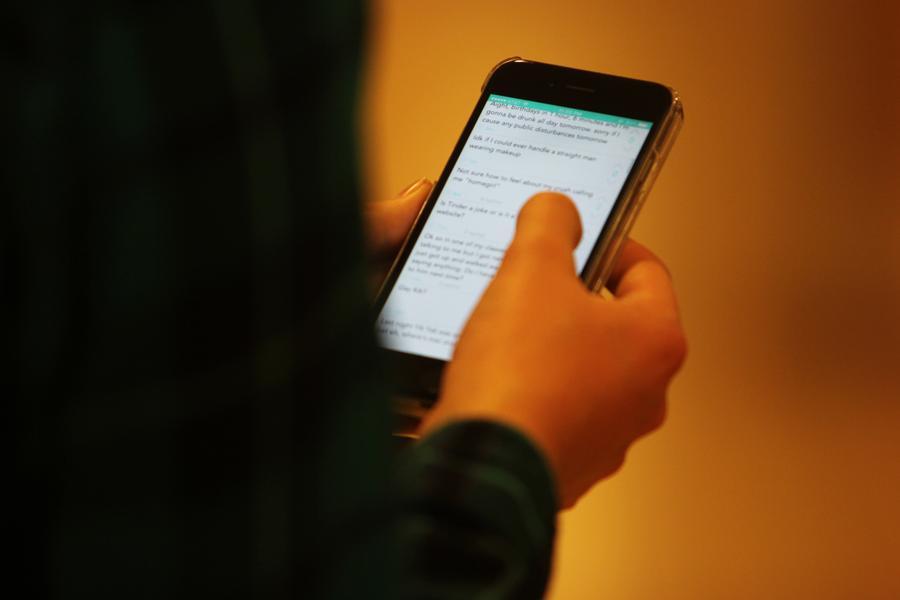The recent arrest of an MU student for posting a threat to Yik Yak is revealing a trend at college campuses across the country. In the past year, more than a dozen investigations were launched after threats were made against universities on the anonymous app.
When it comes to combating the problem, administrations at universities have their hands tied. Due to First Amendment rights, colleges are unable to ban comments that are perceived to be offensive.
Three people have been arrested this year for Yik Yak threats directed at MU students.
On Dec. 14, MU Police Department arrested freshman Nathan Benz after police said he posted that he was going to “bomb” his test, according to an MUPD news release.
This most recent arrest comes after the Nov. 11 arrest of Missouri University of Science and Technology student Hunter Park. Police said Park threatened to “shoot every black person.”
Threats of violence posted on Yik Yak is not a problem limited to MU. College campuses nationally are grappling with how to handle illusive threats made against students by anonymous users.
**Oct. 3, 2015:** A Pennsylvania State University student was arrested for posting his plans to murder “everyone” with an assault rifle, [according to The Morning Call](http://www.mcall.com/news/breaking/mc-penn-state-yik-yak-threat-arrest-1013-20141013-story.html). The student was detained, and the university increased security on campus as a precautionary measure.
**Oct. 11, 2015:** Emily Sakamoto was arrested in connection with a post about “shooting up” Emory University students on the anonymous platform, according to [WALB News 10](http://www.walb.com/story/30240774/student-arrested-for-alleged-terrorist-threat-against-emory).
“Stay in your rooms,” the post read. “The ones on the quad are the ones who will go first.”
According to police reports, she later admitted to creating the post.
**Nov. 2, 2015:** A Fresno State University football player was arrested and held at $20,000 bail in connection with an anonymous threat. Freshman Christian Pryor allegedly posted that he was tired of being ridiculed and ignored, and how he planned to alleviate his frustrations through taking “a headshot at a hot blonde,” with an M4 carbine, [according to The Fresno Bee](http://www.fresnobee.com/news/local/education/article42288816.html). The post also included a photo of the university’s library, according to The Fresno Bee.
**Nov. 17, 2015:** A racially charged “Yak” resulted in campus protests at Lewis and Clark College, [according to USA Today](http://college.usatoday.com/2015/11/18/students-protest-yik-yak-at-lewis-clark/). The anonymous threat advocated for slavery and expressed a desire to “hang you ignorant black people.” Although under investigation, the individual responsible for the post has yet to be taken into custody.
Other universities that have been bombarded by anonymous Yik Yak threats include Charleston Southern University, Western Washington University, Oklahoma State University, Virginia Tech, Texas A&M, BYU-Idaho and Syracuse University.
Counseling Center Director David Wallace said that although individual motivation for posting anonymous threats cannot be determined, there may be a common denominator.
“While there is no excuse for issuing threats to others, people who do so likely feel threatened in some way themselves,” Wallace said in an email.
Individuals who post threats may feel threatened by “a variety of possibilities, including mistrust of other people, fear of others who are different from oneself, disagreements with others with no sense of resolution, having a need for control when that isn’t possible, and other possibilities as well,” Wallace said.
Wallace said that when this feeling of being threatened is not constructively addressed, it can manifest into the desire to intimidate others.
“Rather than working through the conflict in a constructive way, the choice goes to a threat, which does bring harm to others because it incites fear even when the threat is not carried out,” Wallace said.
Wallace said users may feel compelled to post threats on the app because the anonymity may make users feel they can issue threats without consequences.
“I am concerned that we encourage each other to find ways to talk constructively about how we feel and discover peaceful ways to work through problems rather than resorting to threats, openly or anonymously,” Wallace said. “Conflict does not have to be violent or threatening; we can work through conflict through open communication, civility and respect; that means everybody wins.”
_Edited by Hailey Stolze | [email protected]_








